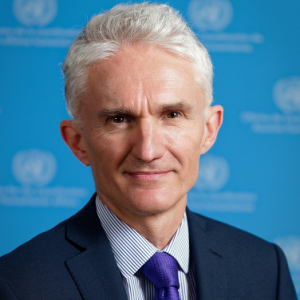Secretary- General, Vice- President, Minister, ladies and gentlemen, good morning, thank you all for being there.
You have in front of you a summary of the Humanitarian Needs Overview and the Humanitarian Response Plan. The Humanitarian Needs Overview is an extremely comprehensive assessment of the detailed needs of the people of Yemen. It reflects more than a hundred earlier assessments.
We also collected new data from nearly 7,000 locations in 331 of Yemen’s 333 districts, and we conducted more than 22,000 interviews. So we know a lot about the needs of the Yemeni people. We have also prepared an extremely sophisticated plan to respond to those needs, and you have that summary in front of you as well.
I would just like to make two points of emphasis building on what the Secretary-General, the Vice-President and the Minister have said.
The first point, and each of them have touched on this, is that the position of women and girls in Yemen is particularly parlous. We had a very powerful afternoon yesterday, many of us, at a meeting with many Yemeni women leaders and one of the big take-aways from that meeting is that the women and girls of Yemen are among those suffering, they are among the victims of this crisis, but they are also part of the solution.
As the Minister has said, one of the things we are doing in the Humanitarian Response Plan this year is designing our intervention in such a way that women and girls can play their part as the solution. And I do encourage you, as you are thinking about how to execute your pledges, to think about the ways in which you are going to help us make that possible.
I hope later on, when we hear from civil society organizations, we will hear from the voice of Yemeni women leaders.
Secondly, we are asking you to pledge generously, this morning, but it also matters how you implement your pledges.
Last year, more than 99 percent of what was promised was delivered. We would like to sustain that record this year. But there are some ways of providing the money which are particularly valuable. I want to flag two to you.
Firstly, contributing to UN’s pooled funds, including the Central Emergency Response Fund, unlocks resources straight away. As the Secretary-General said, I have already allocated, this year, money from the CERF for Yemen, and I could only do that because last year, thanks to your generosity, we had record-breaking fundraising for the CERF. So the CERF and other core un-earmarked contribution are very good ways to contribute.
Secondly, last year, for the first time, we had an exceptional innovative approach to funding our appeal from the Kingdom of Saudi Arabia and the United Arab Emirates in providing a block grant, at the beginning of the year, of an exceptional large amount of money $930 million, in a single payment. That enabled us to have a synchronized approach to scale up our famine prevention programme. In particular, it enabled us to reduce the number of districts from more than a hundred to less than fifty at famine risks because we could have a coordinated response. It enabled us dramatically to reduce the impact of the cholera outbreak last year, from more than a million cases to less than 400,000 cases and it enabled us dramatically to increase the reach to malnourished children and we unquestionably saved millions of lives because of the way resources were provided. And I hope that that approach will be emulated again this year.
So please think about not just the size of your pledge but how you are going to implement it. And in particular, please pay promptly.
I hope that, a year from now, what we will be able to discuss is progress in building a better future for the people of Yemen, whether we can do that depends on what happened today and through the rest of the year, but the people of Yemen deserve a better future.









